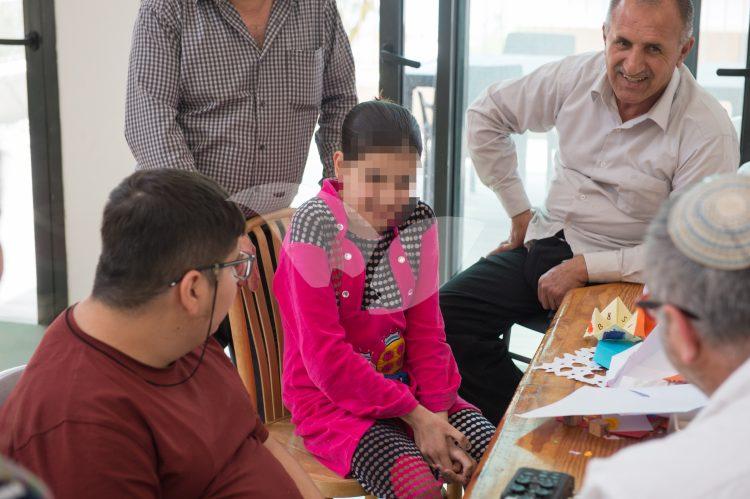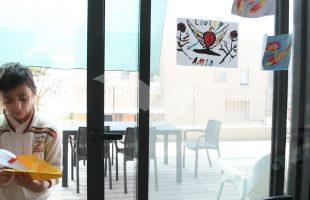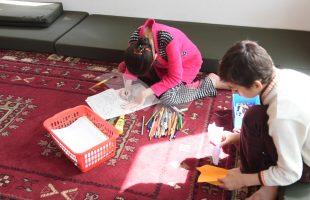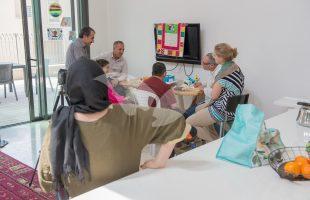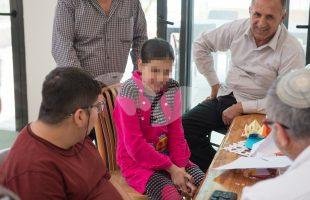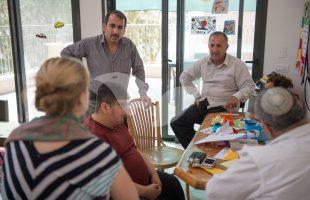From Tel Aviv to Iraq With Love
Jerusalem, 27 June, 2017 (TPS) -- In a light-filled living room in Tel Aviv’s Jaffa quarter, looking out at the Mediterranean, a group of families sit down to a home-cooked lunch prepared by several of the mothers in the group. The meal is simple, but filling: Fresh Kurdish-style pita bread, meat and potatoes with thick gravy, and finely chopped salad.
The members of the group did not know one-another before arriving in Israel, but since traveling here from Iraq they have formed a community of support, mutual concern and brotherhood: The children in the home all suffer from congenital heart disease and have come to Israel for surgery at the Wolfson Medical Center in Holon,
One patient, Evine Abu-Ali, a 17-year-old from Zacho, Kurdistan, says she misses her home and family in Kurdistan, but says that her time in Jaffa has not only given her a new lease on life, but also the opportunity for experiences that will remain foreign to most of her friends and family back home.
“Before I came here, I’d never seen the sea,” says Abu-Ali, who was born with a heart condition that reversed the left and right sides of heart. As a result of the condition, the oxygen level in her blood was very low for the first 15 years of life. That greatly impeded her physical development – in terms of emotional and intellectual development she is a normal teenager, but she is roughly the size of a nine-year-old.
“I’ve also been to Jerusalem. Not many people at home can say that,” she told Tazpit Press Service (TPS).
Treatment is provided by Save a Child’s Heart, an international humanitarian organization founded by Dr. Amram Cohen, an American immigrant to Israel, in 1993 to provide free-of-charge medical care in Israel for children around the world and to improve the quality of pediatric care for children in developing countries by bringing doctors to Israel for training.
For children from the Arab world, logistics falls to a sister organization, Shevet Achim (a reference to a verse in the Book Psalms referring to brotherhood), which intercedes with Israeli authorities to streamline visas and background checks; runs two hostels in Jaffa (one for women and families, one for men); and provides round-the-clock assistance for patients and their families during their time in Israel.
“I wasn’t looking to oversee anything like this,” says Shevet Achim founder and CEO Jonathan Miles, a Colorado native who has divided his time between Israel and Amman, Jordan since 1990, and more recently with Kurdistan. “I came to Israel in my mid-20s to see the ingathering of the Jewish people, the fulfillment of prophecy – the Soviet Union had just collapsed and thousands of Jews were arriving every week. I worked with a group who were providing money, medical care, furniture and more to people who had virtually nothing.
“One day, a woman came in with her 13-year-old son, who had leukemia, and no access to the $65,000 needed for treatment.They weren’t Jewish and so had no rights as Israeli citizens. They must have heard that we were a center for helping Russian immigrants, so they came in, hoping against hope that we’d be able to help.
“To make a long story short, we knew there was treatment available but we certainly did not have access to that kind of money. I told them I’d look into it and invited them to come back tomorrow, but wasn’t very optimistic,” Miles recalls.
With dozens of faxes to well-connected individuals and groups, Miles managed to raise the money, and together with the intervention of then-President Ezer Weizmann convinced the hospital to lower the Wolfson Medical Center administration to lower the cost of the treatment to $42,000, the cost of treatment for Israeli citizens.
“The boy died a year later, but he had the treatment and he died knowing that he was as valuable as anybody else,” Miles recalls. “The incident taught me that there is so much potential in Israeli hospitals to be a blessing to the nations of the world – we formed a non-profit organization and partnered with Save a Child’s Heart.
A quarter-century later, the partnership has served more than 1,000 children.
Nearly all countries in the region have been represented, apart from Lebanon. At first, many children came from Iraq, but religious groups worked hard to pressure local groups to stop working with the Israelis. Today, a fair number of patients come from Iraqi Kurdistan.
Stays at the Shevet Achim homes range from six weeks to six months, depending on recovery time and the extent of medical care needed.
Visiting families say they try to experience Israel as part of their time here, in keeping with the abilities of their children who are necessarily either pre- or post-surgery. As most of the Shevet Achim families are Muslim, Jerusalem’s al-Aqsa Mosque is high on the bucket list of places to visit, but even the ones who don’t make it say they have been “stunned” by the welcome and treatment they receive by hospital staff and Jaffa locals alike.
Evine Abu-Ali, who is on her second stint in Israel, said she has not been able to see much of Jaffa because she has spent most of her time in hospital being treated for atrial fabulation. But she said she has also experienced a lot of what she said “what it means to live here.”
“We had a picnic for Yom HaAtzma’ut,” Abu-Ali told TPS. “We went outside to see the flyover, and we heard about what Independence Day means to Israelis, and especially to bereaved families.
Asked how it feels to be celebrating Israel’s independence, Abu-Ali’s father added that “we happy to celebrate [Israel’s] freedom because we also feel free by being here.
*To download the videos/photos

